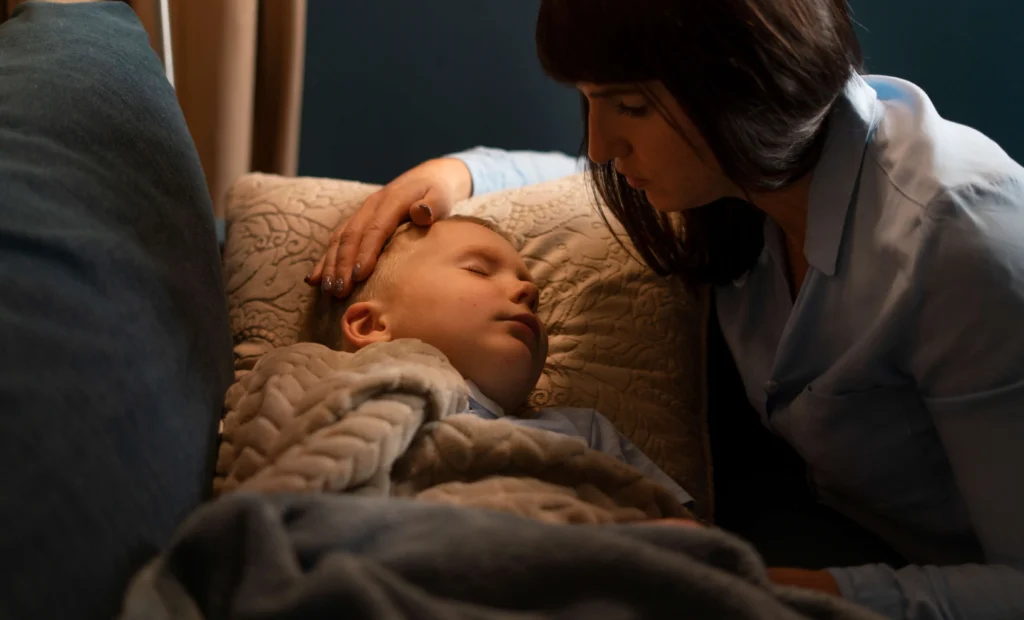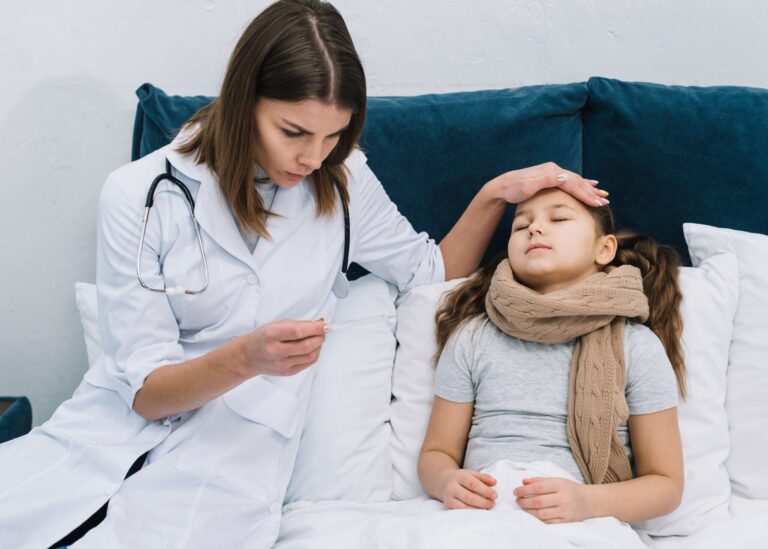Navigating the health challenges that children face can be daunting for any parent. Recognising the signs of common childhood illnesses early can significantly improve outcomes for our little ones. Prompt diagnosis and treatment not only safeguard a child’s health but also reduce the stress and anxiety felt by families.
In bustling London, where the pace of life never slows, understanding these illnesses is crucial. Early intervention can prevent complications, enabling children to return to their healthy, playful selves more quickly. This understanding is not just about treatment—it’s about ensuring long-term health and wellbeing.
Our focus here is on the prevalent childhood diseases that affect many families across the city. Knowing what to look out for can empower parents to act swiftly and seek the right paediatric care when it’s most needed.
This guide is designed to provide you with essential knowledge about these illnesses, helping you to navigate the complexities of paediatric health care with confidence. As we explore the most common ailments, you’ll learn how to spot early warning signs and understand the steps for effective management and treatment.
Overview of Prevalent Childhood Diseases

From the common cold to more serious conditions like asthma and measles, childhood diseases vary widely. This section delves into the illnesses most frequently encountered among children in London, offering a clear snapshot of what parents should be aware of. Stay informed to ensure your child’s health and well-being.
Common Viral Infections in Childhood
Viral infections like the flu, chickenpox, and hand, foot, and mouth disease are commonplace among children. Each presents unique symptoms and challenges, which we will explore to help you identify and manage these infections effectively.
Common Cold
The common cold is a frequent visitor in households with children, marked by a runny nose, cough, and mild fever.
Symptoms: Children may experience a runny or stuffy nose, a cough, and a slight fever as the body fights off the virus.
Duration and Typical Management: Most colds resolve within a week. Comfort measures like increased fluid intake, rest, and saline nasal drops can help alleviate symptoms.
Influenza (Flu)
Influenza, or the flu, is more severe than the common cold and can significantly affect a child’s health.
Symptoms: High fever, body aches, and fatigue are hallmark signs of the flu, making quick identification crucial.
Importance of Vaccination: Annual flu vaccinations are recommended to prevent the spread of the virus and reduce the severity of symptoms should your child become infected.
Gastrointestinal Illnesses in Childhood
Gastrointestinal issues are prevalent in young children, often manifesting as stomach aches, vomiting, or diarrhea.
These conditions can range from mild to severe, requiring prompt attention to prevent dehydration and further complications. Understanding how to manage these symptoms at home and when to seek medical advice is key to effective care.
Gastroenteritis
Gastroenteritis, often referred to as stomach flu, can be particularly distressing for children and parents alike.
Symptoms: Key signs include vomiting, diarrhea, and stomach pain, which can lead to dehydration if not managed properly.
Causes: It is commonly caused by viral infections, though bacterial infections can also be culprits. Hygiene and prompt medical consultation are essential in managing its spread and severity.
Food Allergies
Food allergies are a growing concern, affecting numerous children across varying ages.
Common Allergens in Children: Peanuts, tree nuts, milk, eggs, and shellfish top the list of common triggers.
Symptoms and Management: Symptoms can range from mild rashes to severe respiratory issues. Early identification and avoidance of allergens, along with appropriate medical interventions, are crucial for safety and long-term management.
Respiratory Conditions
Respiratory issues in children can range from mild to severe, impacting their breathing and overall well-being.
Understanding these conditions is crucial for early detection and management, helping to ensure that young ones receive the appropriate care and treatment.
Asthma
Asthma is a prevalent respiratory condition that can significantly affect a child’s quality of life.
Symptoms: Common symptoms include wheezing, shortness of breath, and chest tightness, which can vary in frequency and intensity.
Triggers and Management Strategies: Triggers such as allergens, cold air, and exercise require careful management. Regular monitoring and tailored treatment plans are essential for keeping asthma under control.
Bronchiolitis
Bronchiolitis is a serious respiratory condition primarily affecting infants and young children.
Symptoms: It is characterized by difficulty breathing, wheezing, and a persistent cough.
Typically Affects Infants; When to Seek Help: This condition is especially concerning in infants under two years old. Parents should seek medical attention if their child shows signs of distress, dehydration, or lethargy.
Skin Conditions
Skin conditions in children are not only common but can also cause discomfort and distress.
Recognising and managing these conditions early can help alleviate symptoms and prevent complications, enhancing your child’s comfort and health.
Eczema (Atopic Dermatitis)
Eczema is a common skin condition that typically appears in early childhood.
Symptoms: It is characterized by dry, itchy skin, which can be uncomfortable for the child.
Triggers and Treatment Options: Triggers vary but often include irritants like soaps and detergents. Moisturizing regularly and avoiding known irritants are key, along with prescribed treatments for flare-ups.
Chickenpox
Chickenpox is a well-known childhood illness, marked by an itchy rash and mild fever.
Symptoms: The disease presents with a distinctive itchy rash, fever, and body aches.
Importance of Vaccination and Management: Vaccination is crucial to prevent the disease or lessen its severity. Managing symptoms includes relieving itchiness and monitoring for complications, especially in younger children.
Other Common Illnesses
Beyond the typical viral and skin conditions, children may encounter a variety of other illnesses.
Understanding the breadth of these conditions is crucial for early recognition and effective management, ensuring your child receives appropriate care when needed.
Ear Infections (Otitis Media)
Ear infections are a frequent concern, particularly in younger children.
Symptoms: Symptoms include ear pain, fever, and irritability, which can be distressing for both child and parent.
Typical Treatment Options: Treatment usually involves pain management and, in bacterial cases, antibiotics. It’s important to follow medical advice to prevent complications.
Hand, Foot, and Mouth Disease
This contagious illness often sweeps through nurseries and schools.
Symptoms: It presents with fever, mouth sores, and a rash on the hands and feet.
Contagion and Management Strategies: The disease is highly contagious, so good hygiene and isolation during the contagious period are key. Symptom relief and hydration are the main management strategies.
When to Seek Paediatric Care in London
Determining when to seek medical advice is key to managing your child’s health effectively.
In London, a city bustling with options, knowing the right time to consult a paediatrician can streamline care and ensure that minor issues don’t develop into major concerns. Prompt action is essential, especially when symptoms persist or worsen.
Signs Indicating Need for Medical Attention
Recognizing the signs that necessitate a doctor’s visit is crucial for any parent. Here are key indicators:
- Persistent Fever: A fever that lasts more than a few days can be a sign of a more serious infection.
- Severe Symptoms or Discomfort: If your child is in significant pain or discomfort, it’s time to seek medical advice.
- Signs of Dehydration: Watch for signs like dry mouth, no tears when crying, and less frequent urination.
- Difficulty Breathing: Struggling for breath or rapid breathing are immediate red flags.
- Changes in Behavior or Alertness: If your child is unusually lethargic or irritable, it might indicate a serious problem.
Understanding and acting on these signs can lead to timely and effective treatment, ensuring the best possible outcome for your child.
Importance of Timely Intervention
Acting quickly when your child shows signs of illness can make all the difference in their recovery.
Preventing Complications: Early treatment helps prevent minor conditions from escalating into serious health problems. Quick intervention often leads to a faster, smoother recovery.
Role of Parents: Parents play a crucial role in monitoring symptoms and seeking medical advice when necessary. Being vigilant about changes in your child’s health is key to ensuring they receive the care they need promptly.
How a Private GP in London Can Assist
A private GP in London offers fast and accessible care for childhood illnesses.
They provide personalised attention, quick appointments, and comprehensive treatment plans. Whether it’s diagnosing common conditions or referring to specialists, a private GP ensures your child gets the timely care they need.
Comprehensive Assessments
A thorough assessment is key to identifying and treating childhood illnesses effectively.
- Detailed Medical History and Physical Examination: Private GPs will take a complete history and perform a physical exam to understand your child’s condition better.
- Access to Diagnostic Tests: They can also arrange for lab tests, imaging, and screenings. These tests are essential for accurate diagnosis and ensuring appropriate treatment is given promptly.
Tailored Treatment Plans
Every child’s needs are unique, and treatment should reflect that.
- Individualized Care Strategies: Private GPs create personalised treatment plans based on your child’s specific condition and health needs.
- Medication Management: Safe prescribing is crucial, ensuring that medications are appropriate for your child’s age and weight, with clear instructions to avoid any complications.
Ongoing Support and Follow-Up
Consistent care is vital to ensure your child’s health and well-being over time.
- Regular Check-Ups: Regular visits help track your child’s progress and catch any issues early.
- Monitoring Chronic Conditions: Continuous care for conditions like asthma is essential. Ongoing monitoring ensures proper management and adjustments to treatment as needed.
Parental Guidance and Education
Educating parents is key to maintaining a child’s health and preventing illness.
- Providing Information on Childhood Illnesses: Private GPs offer guidance on recognising and managing common childhood conditions, helping parents feel more confident in caring for their children.
- Counselling on Nutrition and Lifestyle: They also provide advice on healthy eating and lifestyle habits. These tips are crucial for promoting overall well-being and preventing future health issues in children.
Referral to Specialists
In some cases, specialist care is essential for managing complex health issues.
- When Specialist Care is Necessary: If your child’s condition requires more advanced treatment, your GP will recommend a specialist.
- Coordination of Care with Paediatricians and Specialists: Private GPs ensure seamless coordination with paediatricians and other specialists to provide comprehensive care for your child.
Conclusion
Understanding common childhood illnesses is vital for ensuring the health and well-being of your child. By staying informed and taking proactive steps, parents can help prevent complications and keep their children healthy.
Consulting a private GP in London offers personalised care, early diagnosis, and effective treatment plans, ensuring your child receives the best possible care. If you have any concerns about your child’s health, don’t hesitate to schedule a consultation with a private GP. Early intervention can make all the difference.

